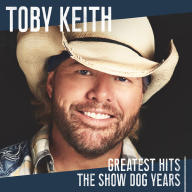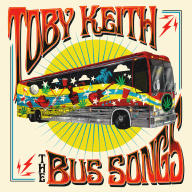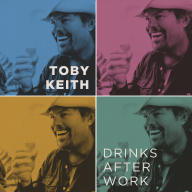Keith was born Toby Keith Covel in Clinton, Oklahoma in 1961 and grew up mostly on a farm in Moore, near the outskirts of Oklahoma City. He took up guitar at age eight, inspired by the country musicians who played at the supper club his grandmother ran. He listened to his father's Bob Wills records and fell in love with Haggard's music. He worked as a rodeo hand while in high school, and after graduation, he found work in the nearby oil fields. In the meantime, he formed the Easy Money Band and played Alabama-style country-rock in area honky tonks. After about three years, the oil industry hit a major downturn, and Keith turned to playing semi-pro football for a USFL farm team, even trying out (unsuccessfully) for the short-lived league's Oklahoma City franchise. Following two years as a football player, Keith decided to focus on music and adopted a much more rigorous touring schedule. He cut a few records for local indie labels, and his demo tape eventually found its way to one-time Alabama producer Harold Shedd, who helped Keith land a deal with Mercury.
Keith's self-titled debut album was released in 1993 and made him an out-of-the-box success with its chart-topping single "Should've Been a Cowboy." Three more songs from the record -- "Wish I Didn't Know Now," "A Little Less Talk and a Lot More Action," and "He Ain't Worth Missing" -- made the Top Five, and the album sold over two million copies. "Who's That Man," the lead single from his second album, Boomtown, was released in late 1994 and became his second number one; Boomtown hit stores in early 1995 and went gold on the strength of further Top Ten hits "Upstairs Downtown" and "You Ain't Much Fun." Keith followed it later that year with the holiday record Christmas to Christmas and returned with the proper album Blue Moon in 1996. Its first two singles, "A Woman's Touch" and "Does That Blue Moon Ever Shine on You," went Top Ten, and the third, "Me Too," gave Keith his third number one, also helping the album go platinum. Released in 1997, Dream Walkin' marked his first collaboration with prolific producer James Stroud, with whom he would work regularly from then on. "We Were in Love" and the title track were both Top Five hits, as was "I'm So Happy I Can't Stop Crying," a duet with Sting. However, Keith longed for an even bigger breakthrough, and he was growing dissatisfied with Mercury's promotional efforts. In 1999, he left the label and followed Stroud over to the Nashville division of DreamWorks.
Keith's label debut, How Do You Like Me Now?!, appeared in late 1999 and started to bring him the wider recognition he felt poised for. The title cut went to number one on the country charts and brought him his first Top 40 pop hit; its follow-up, "Country Comes to Town," went Top Five, and "You Shouldn't Kiss Me Like This" also hit number one. Overall, the album had a rough, brash attitude that helped give Keith a stronger identity as a performer. It was also the first to bring him those long-desired major industry awards, when in 2001 the Academy of Country Music named him Male Vocalist of the Year and named How Do You Like Me Now?! its Album of the Year. In the meantime, Keith became more visible in the mainstream media, appearing in cameos on Touched by an Angel and in a Dukes of Hazzard TV reunion movie, as well as co-starring in a series of telephone commercials. Later in 2001, his follow-up album, Pull My Chain, became his first to top the country charts and also his first Top Ten pop album. It spun off three number one singles: "I'm Just Talkin' About Tonight," "I Wanna Talk About Me," and "My List."
Keith was already a burgeoning superstar when he recorded "Courtesy of the Red, White and Blue (The Angry American)" in the summer of 2002. A raging response to the September 11 terrorist attacks, the song struck a fierce chord with aggressively patriotic listeners, while others condemned it as knee-jerk jingoism. The whole controversy came to a head when ABC News anchor Peter Jennings objected to Keith's performance on a network Fourth of July schedule. Keith was axed from the guest list, and the ensuing media flap proved to be a publicity coup. Meanwhile, the song went to number one on the country charts and crossed over into the pop Top 25. All of this set the stage for Unleashed, which sold like hotcakes upon its release later in 2002, debuting at number one on both the country and pop charts. "Who's Your Daddy?" was a number one country hit, and the Willie Nelson duet, "Beer for My Horses," also made the country Top Ten.
In 2003, Keith released Shock'n Y'All, which, despite its title, was chock-full of enough rough-and-rowdy hits to once again connect hugely with heartland America. Honkytonk University followed in May 2005, the same year that Mercury released Chronicles, a collection of three of his biggest albums: Toby Keith, Boomtown, and Blue Moon. After departing from Universal and longtime producer Stroud, Keith established his own company, Show Dog Nashville, and in 2006 released the label's first record, the number two hit White Trash with Money. A year later he released Big Dog Daddy, the first album he produced himself, and also a holiday album, A Classic Christmas. Keith continued his steady pace over the next few years, releasing That Don't Make Me a Bad Guy in 2008, American Ride in 2009, and Bullets in the Gun in 2010. Clancy's Tavern, which appeared in 2011, was inspired by his grandmother's club, which he visited frequently as a child. Keith was also selected Artist of the Decade at the American Country Awards in December of 2011. Clancy's Tavern gave Keith a pair of hits in "Made in America" and "Red Solo Cup" -- the former topped Billboard's country charts; the latter reached the Billboard Top 40.
In the fall of 2012 he returned with another new album, Hope on the Rocks, which was preceded by the single "I Like Girls That Drink Beer." Neither "I Like Girls That Drink Beer" nor the album's second single, "Hope on the Rocks," went further than 17 on the charts, and Keith soon returned with his 17th album, Drinks After Work. Released almost a year to the day after Hope on the Rocks, Drinks After Work appeared in late October 2013; it was preceded by the single release of its title track, which peaked at number 28 on the country charts. The follow-up, "Shut Up and Hold On," made it to number 49. Keith released "Drunk Americans," the first single from his forthcoming album, in October 2014 but it took another full year before 35 MPH Town materialized, preceded by the title track as a single in the spring of 2015. Keith toured 35 MPH Town through 2016 and returned in September 2017 with The Bus Songs, a collection of the ribald tunes he'd tucked away on his albums supplemented with two new songs. Following a 25th anniversary reissue of his eponymous 1993 debut, retitled Should've Been a Cowboy, Keith wrote the acoustic ballad "Don't Let the Old Man In," for Clint Eastwood's film The Mule. "Don't Let the Old Man In" was featured on the 2019 compilation Greatest Hits: The Show Dog Years.
After releasing the non-LP single "What's Up Cuz" in 2020, Toby Keith returned in 2021 with Peso in My Pocket. Its first single, "Old School," peaked at 25 on Billboard's Country Airplay, his best placement since 2014's "Drunk Americans." ~ Steve Huey, Rovi


















